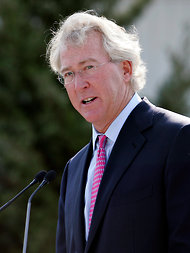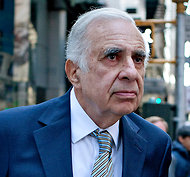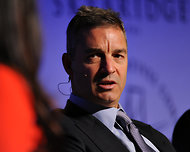 Associated PressChesapeake Energy‘s chief, Aubrey McClendon, has come under fire.
Associated PressChesapeake Energy‘s chief, Aubrey McClendon, has come under fire.
 Scott Eells/Bloomberg NewsCarl C. Icahn helped lead a shareholder revolt against Chesapeake.
Scott Eells/Bloomberg NewsCarl C. Icahn helped lead a shareholder revolt against Chesapeake.
 Jacob Kepler/Bloomberg NewsDaniel Loeb’s hedge fund pushed Yahoofor changes.
Jacob Kepler/Bloomberg NewsDaniel Loeb’s hedge fund pushed Yahoofor changes.
Every spring, corporate chieftains and their boards squash uprisings from a familiar batch of pugnacious investors, a ritual that shields many companies from major change.
This proxy season was different. In recent weeks, chief executives and directors have gone up against a more formidable foe than the typical corporate gadfly: the mainstream investor.
It is the changing face of shareholder activism. While proxy season has long been the domain of labor unions and activist investors with large personalities and forceful demands, increasingly it is mutual funds and other more tempered institutional shareholders who are criticizing lavish pay packages and questioning corporate governance.
Emboldened by new regulations — and angered by laggard stock performance and recent scandals — this new crop of activists is voting down company policies and backing proposals to reform corporate boards. The movement has already stung a variety of companies, including Citigroup, Goldman Sachs and Wal-Mart.
At its annual shareholder meeting in Oklahoma City on Friday, Chesapeake Energy will confront an army of angry institutional investors shouting for a shake-up at the embattled company. Shareholders, already exercised about the company’s underperforming stock, have seized on revelations that Chesapeake’s chief executive took personal loans from the company’s lenders.
The effort is bearing fruit. Attempting to placate detractors, Chesapeake agreed this week to shuffle its board. The move followed a string of shareholder triumphs at Canadian Pacific Railway, Barclays and other companies.
“Chesapeake is an excellent example of the changing impact of shareholder activism and the effectiveness of that activism,” said Charles M. Elson, director of the John L. Weinberg Center for Corporate Governance at the University of Delaware.
“Years ago, it was really just the large pension funds and labor funds,” he said. “Today you’re seeing a very wide mix of people.” Mr. Elson noted that one of Chesapeake’s chief critics is Southeastern Asset Management, a large money manager known as a low-key investor.
While levying a more potent attack than the average shareholder, big money managers and mutual funds are a small segment of the activist population. Large union-affiliated pension funds and select individual investors remain the most dogged harassers of corporate boards and executives, data shows.
Even so, one of the most prominent gadflies, Evelyn Y. Davis, who calls herself the Queen of the Corporate Jungle, scaled back her activism this year. And some “socially concerned” asset managers are sitting out this proxy season. Religious investors, those with ties to Catholic nuns and other spiritual outfits, have introduced only seven shareholder proposals so far this year, down from 23 in 2011, according to Proxy Monitor, a public database sponsored by the Manhattan Institute that tracks shareholder proposals.
Others have been busy. The number of shareholder proposals, one measure of activism, grew by 3 percent this year to 595, according to Broadridge Financial Solutions, a technology company that processes proxy votes. Even a modest rise is significant because new regulations made certain votes mandatory, meaning that shareholders no longer had to put them on the ballot.
“We’re looking at a bumper crop of proxy fights,” said Patrick McGurn, special counsel at Institutional Shareholder Services, which advises shareholders on proxy voting. “It looks like we’ll see more fights during the first half of 2012 than we tracked for the entire year in 2011.”
Shareholders have taken broad aim at corporate governance. They paid particular attention to so-called classified boards, in which directors serve terms of different lengths. The number of declassification proposals shot up 41 percent this year, to 79 proposals, according to Institutional Shareholder Services. The growth stemmed in part from an initiative by Harvard Law School’s Shareholder Rights Project.
A series of recent management mishaps has given investors plenty of ammunition. At Yahoo, a firestorm erupted when it emerged that the company’s chief executive, Scott Thompson, misstated information on his résumé. The hedge fund Third Point, a major Yahoo shareholder that started pushing for change earlier this year, called for Mr. Thompson to step down in May, which he soon did. It was the hedge fund’s first real activist fight in five years.
Wal-Mart, too, has faced intense scrutiny from prominent shareholders. In the wake of a New York Times article exposing bribery in Wal-Mart’s Mexican arm, the nation’s second largest public pension fund, the California State Teachers’ Retirement System, sued the company and voted against all of its board members. The pension fund railed against “a breakdown of corporate governance.”
While the skirmish has yet to yield changes at Wal-Mart, other embattled companies are making concessions. Chesapeake this week agreed to eject four of its nine board members. The company will replace them with board members handpicked by its two largest shareholders, Southeastern Asset Management and Carl C. Icahn.
The shareholder revolt at Chesapeake, which stemmed from concerns about the company’s shaky financial position, became a broad critique of the company’s chief executive, Aubrey K. McClendon, and the board’s weak oversight of his activities. Some have questioned why Mr. McClendon borrowed more than $1 billion from financial firms that were also lending to Chesapeake, asking whether Mr. McClendon allowed the company to pay high rates so he could receive a special deal. Chesapeake has said that he used the money to pay for his share of the company’s natural gas and oil wells.
Mr. Icahn is a well-known activist, but Southeastern shies away from the spotlight. It worked behind the scenes with Chesapeake as Mr. Icahn led from the front lines of the fight.
Other unlikely partnerships formed amid a shareholder face-off against Canadian Pacific Railway. William A. Ackman, a strident activist, led a lengthy proxy fight to oust the railroad’s chief executive. But it was not until May, just days after a major Canadian pension fund jumped on board, that the railroad’s chief executive resigned.
“When traditionally quieter investors join the chorus, it resonates so much more,” said Dominic J. Auld, a lawyer at Labaton Sucharow who represents institutional investors in challenges against public companies. Mr. Auld, whose law firm represents the California pension fund in its battle against Wal-Mart, added that mainstream investors are increasingly hiring in-house experts to vet companies and pinpoint problems with board members.
The board of Goldman Sachs was among the recent targets. In April, the managers of Sequoia Fund took aim at James A. Johnson, the chairman of Goldman’s compensation committee. The shareholders issued a broad rebuke of Mr. Johnson’s corporate career, specifically his tenure as chief executive of Fannie Mae, the mortgage finance titan that collapsed at the height of the financial crisis. At the bank’s recent shareholder meeting, Mr. Johnson kept his seat on the board.
Other big banks have faced tough shareholder uprisings for doling out supersized paychecks. Under pressure from investors, Barclays, the big British bank, announced in April that its executives would forfeit portions of their bonuses if it failed to meet certain profit goals.
Citigroup shareholders in April rejected the bank’s $15 million pay package for its chief executive, Vikram S. Pandit. The vote, known as a nonbinding “say on pay” ballot, was mandated under the Dodd-Frank regulatory law. About 55 percent of the shareholders voting were against the Citi compensation plan, including mainstream institutional investors like pension fund and mutual fund managers. In a statement at the time, Citigroup said it “takes the shareholder vote serious” and will “carefully consider their input as we move forward.”
“We’re not trying to be activists,” said Brian Wenzinger, a principal at Aronson Johnson Ortiz, a Philadelphia money management company that voted against the Citigroup pay package. “Shareholders are paying attention to what C.E.O.’s are getting paid. Investors can’t ignore it anymore.”
Article source: http://dealbook.nytimes.com/2012/06/07/once-reticent-investors-join-shareholder-revolts/?partner=rss&emc=rss
Speak Your Mind
You must be logged in to post a comment.